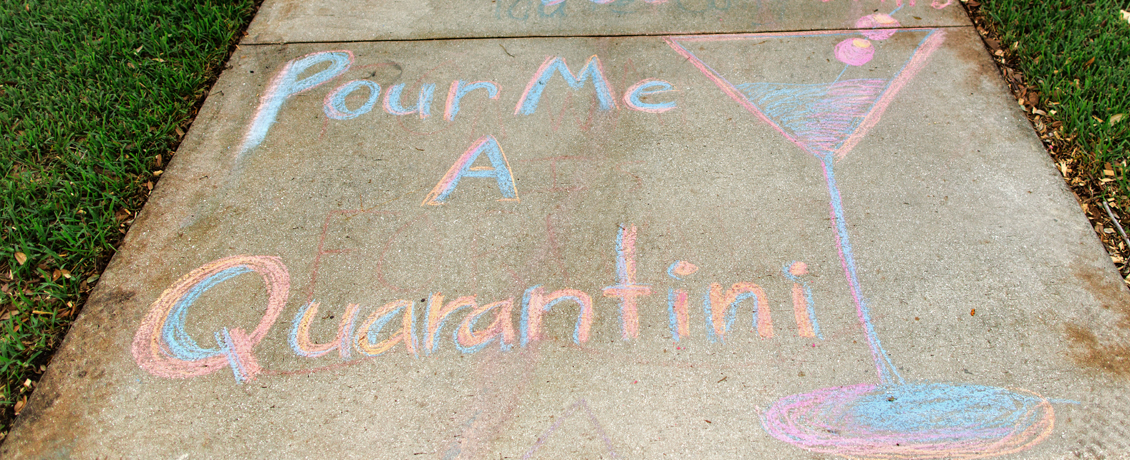Beware the ‘quarantini’
Purdue addictions expert cautions against increased drinking during pandemic
Story by Aaron Martin
"Because COVID-19 is such a major stress on everyone’s lives, this is a vulnerability for all of us. Preliminary findings suggest that people are drinking more, and that the number of calls to suicide centers and mental health treatment centers are increasing. So, there are serious consequences." — Julia Chester, professor of psychological sciences
Almost as quickly as the COVID-19 pandemic hit the United States, the term “quarantini” entered our cultural lexicon. A quarantini is a strong alcoholic beverage, similar to a martini, that one drinks when quarantined.
A quarantini might sound like fun these days — special recipes are a popular topic on social media. But Julia Chester, a neuroscientist at Purdue University, believes the whimsical drink paints a happy face onto a hidden danger. Increased drinking during these stressful times, she says, could leave individuals vulnerable to developing an alcohol use disorder (AUD).
“There is little doubt that many people, for the first time, will start developing an AUD as a consequence of this pandemic,” says Chester, a professor of psychological sciences in Purdue’s College of Health and Human Sciences.
“Because COVID-19 is such a major stress on everyone’s lives, this is a vulnerability for all of us,” Chester adds. “Preliminary findings suggest that people are drinking more, and that the number of calls to suicide centers and mental health treatment centers are increasing. So, there are serious consequences.”
 Purdue neuroscientist Julia Chester, who believes whimsical drinks like the “quarantini” represent a hidden danger during these stressful times.
Purdue neuroscientist Julia Chester, who believes whimsical drinks like the “quarantini” represent a hidden danger during these stressful times.
AUDs are characterized by a pattern of alcohol use that involves certain behaviors. These include having problems controlling one’s drinking, being preoccupied with alcohol, continuing to use alcohol even when it causes problems, having to drink more to get the same effect, and/or having withdrawal symptoms when one rapidly decreases or stops drinking.
Understanding the behavior
Chester’s research focuses on the development and characterization of animal models as tools to identify biological and behavioral mechanisms that influence risk AUDs and other comorbid psychiatric disorders such as post-traumatic stress disorder (PTSD) in humans.
“I look into the phenotypic traits, behavioral traits and neurochemical traits that are co-related with drinking behavior,” Chester says. “That information allows us to understand the common genetic architecture that is influencing mechanisms in the brain that act on drinking behavior.”
Chester’s research is based on her fundamental understanding of the many factors that can lead to AUD, as well as signs of the disease and suggested treatment options. She sees feelings of stress, anxiety, uncertainty and isolation — all common risk factors for AUD — as being particularly prevalent during the COVID-19 crisis.
“We know that major traumatic events in the world lead people to developing AUDs,” Chester says. “This happened after 9/11 and it happens after major natural disasters. So, it’s bound to happen now.”
To Chester, social media represents a double-edged sword in these troubled times. While outlets like Facebook are increasingly important as a place for people to interact, social media also has become a hotbed for the promotion of drinking.
The rise of the quarantini is a prime example.
“When I go on social media, some of the first things I see are about the quarantini and people making jokes about alcohol. In fact, I have a friend who invited me to her quarantini page on Facebook,” says Chester, who teaches a class on AUD at Purdue. “You really have to be careful there. For so many people, it’s not funny — it’s a real struggle. A drinking problem can be devastating.”
Social media may be problematic, but Chester sees one major benefit of living in today’s digital age: the availability of online resources.
From basic information and diagnostic tools to online meetings and suggested treatment options, vulnerable people or those who love them can use the internet to be equipped to deal with AUD. Chester suggests that people visit the National Institute on Alcohol Abuse and Alcoholism (NIAAA) website for a comprehensive collection of information and resources.
“There’s a lot of research showing that people just becoming educated about normal drinking habits and being aware of their own drinking can really help them,” Chester says. “They can often manage the problem on their own.”
More Life 360 Stories
Milestones
Alumni
- Model Behavior
- On the Frontline of COVID-19
- Alumni making giant leaps in health care, aviation industries
- Tradition Transformed
- Emerging Leaders
Research
- Wearable and affordable, device targets swallowing disorders
- Evolution of a Research Relationship: From PhD Student to Peer
- Rapid Response Grant Recipients
Faculty
- Wearable and affordable, device targets swallowing disorders
- Beware the ‘quarantini’
- Safe and sustainable tourism in times of COVID-19
- Building a Community of Support
- Adapting Online … in a Hurry
- Thinking Beyond the Pandemic
- Rapid Response Grant Recipients
- Risk & Resilience: How the Pandemic Affects Those with Special Needs
Students
- Evolution of a Research Relationship: From PhD Student to Peer
- On the Frontline of COVID-19
- Tradition Transformed
- Adapting Online … in a Hurry
- Pandemic Pivot brings Gen Zs and Baby Boomers together in unique way
- HTM students learn and build community
- Emerging Leaders

